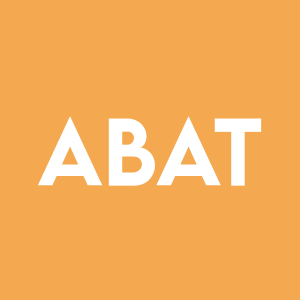American Battery Technology Company’s Tonopah Flats Lithium Project Selected by Trump Administration for Fast-Track Permitting as Critical Mineral Priority Project
Rhea-AI Summary
American Battery Technology Company (NASDAQ: ABAT) announced its Tonopah Flats Lithium Project (TFLP) has been selected as a FAST-41 Transparency Priority Project by the Trump Administration, enabling fast-track permitting for this critical mineral project. The project includes a domestic lithium mine and a 30,000-tonne lithium hydroxide per year refinery in Nevada.
The company has received significant financial backing, including a $58 million grant from the U.S. Department of Energy and a $900 million Letter of Interest (LOI) from the Export-Import Bank of the United States for project expansion. ABTC has already demonstrated its critical mineral processing technologies at pilot scale, successfully manufacturing battery-grade lithium hydroxide from claystone collected from the Tonopah Flats site.
The project, located in central Nevada, represents one of the largest identified claystone resource deposits in the United States. The facility's design and construction are being led in partnership with Black & Veatch, building upon ABTC's successful pilot operations. This initiative aligns with President Trump's March 2025 Executive Order on increasing American mineral production and strengthening domestic critical mineral supply chains.
Positive
- Selection as FAST-41 Transparency Priority Project enables streamlined federal permitting
- Secured $58 million DOE grant and $900 million EXIM Bank Letter of Interest for financing
- Successfully demonstrated lithium hydroxide production at pilot scale
- Project site contains one of the largest known lithium deposits in the United States
- Planned 30,000 metric tons annual lithium hydroxide production capacity
Negative
- Project requires coordination with multiple federal agencies for permitting approvals
- Relies on unconventional lithium-rich claystone material versus traditional sources
News Market Reaction
On the day this news was published, ABAT gained 10.96%, reflecting a significant positive market reaction.
Data tracked by StockTitan Argus on the day of publication.
Reno, Nev., June 30, 2025 (GLOBE NEWSWIRE) --
- **Listing as a FAST-41 Transparency Project by the U.S. Permitting Council supports coordinated federal permitting of this domestic lithium mine and a 30,000 tonne lithium hydroxide per year refinery, located on the company’s Nevada Tonopah Flats Lithium Project site **The designation of Priority Projects by the U.S. Permitting Council, in coordination with the National Energy Dominance Council (NEDC), is directed by President Trump’s March 20, 2025 Executive Order on Immediate Measures to Increase American Mineral Production
**The company has already successfully demonstrated its critical mineral processing technologies at pilot scale and manufactured battery-grade lithium hydroxide from claystone collected from its Tonopah Flats lithium resource in Nevada, one of the largest known lithium deposits in the United States
American Battery Technology Company (NASDAQ: ABAT), an integrated critical battery materials company commercializing both the development of primary battery minerals and the recycling of lithium-ion batteries, is pleased to announce that its Tonopah Lithium Flats Project (TFLP) has been selected as a Transparency Priority Project by the U.S. Federal Permitting Council. This designation highlights the projects critical role in advancing domestic critical mineral lithium production and supporting U.S. energy independence. The project is now featured on the FAST-41 Permitting Dashboard, underscoring its importance as a national priority.
“We are excited by this selection of our Tonopah Flats Lithium Project as a FAST-41 critical mineral Transparency Project,” stated American Battery Technology Company CEO Ryan Melsert. “As we are currently working through permitting efforts with multiple federal agencies for the construction of this domestic critical mineral project, the support to coordinate and fast-track these efforts is greatly appreciated.”
For ABTC’s Tonopah Flats Lithium Project, this distinction marks a significant milestone in its development. Situated in central Nevada, the project encompasses one of the largest identified claystone resource deposits in the United States, and has the foundation to play a pivotal role in addressing the nation's growing needs for onshoring battery-grade lithium, an essential component in the production of advanced energy storage, defense systems, medical devices, electronic vehicles, and consumer electronics.
“This is an exciting time as we work with our colleagues across the federal government to unleash America’s vast energy and mineral resources.” said Emily Domenech, Permitting Council Executive Director, in a press release Trump Administration Announces Addition of Three New Critical Mining Projects to the Federal Permitting Dashboard highlighting ABTC’s Tonopah Flats Lithium Project as one of the council’s newest listings. “The Permitting Council stands ready to bring the transparency of our program to these projects, speeding the production of the critical minerals needed for our national and economic security.”
The designation as a Priority Project is especially beneficial when a company is engaged with multiple federal agencies for project permitting. The TFLP is located on land managed by the US Department of Interior, while the project has also received a competitive
ABTC's Tonopah Flats Project is strongly aligned with EXIM’s “Make More in America” initiative as well as its “China and Transformational Export Program,” both of which provide beneficial financing terms for U.S. companies facing competition from the People’s Republic of China to ensure the United States leads in certain critical export areas, including the domestic manufacturing of critical minerals.
The Fast 41 Transparency Project selection and the issuance of the U.S. EXIM LOI is aligned with President Trump’s Executive Order from March 20, 2025, titled “Immediate Measures to Increase American Mineral Production” which directs federal agencies, including EXIM, to unlock permitting, funding, and offtake agreements for domestic critical mineral manufacturing facilities. The Executive Order includes near-term actions to be determined and implemented by the agencies to fast-track permits, mobilize capital for mineral producers, and create offtake agreements for strategic stockpiling for minerals critical to the United States’ defense, technology, and energy.
In accordance with SEC guidelines, in April 2024, ABTC published its amended Initial Assessment*, which presents the technical and economic study of this project and concluded that this resource is one of the largest known lithium resources in the United States.
The company has already successfully demonstrated its internally-developed technologies and manufactured battery-grade lithium hydroxide at its multi-tonne per day pilot demonstration plant from claystone collected from its Tonopah Flats Lithium resource site. This success serves as the foundation for the development of a commercial-scale lithium hydroxide refinery, which is designed to manufacture 30,000 metric tons of lithium hydroxide annually. The design and construction of this facility are being led in partnership with global engineering firm Black & Veatch, leveraging the blueprint established by ABTC’s pilot operations.
Throughout the world lithium products are generally manufactured from conventional feedstock resources, which include hard rock spodumene materials primarily from western Australia and lithium-rich brines primarily from South America; however, the U.S. does not have large quantities of these conventional resources. As a result, to significantly increase U.S. production of battery grade lithium products, ABTC has developed its own low-cost and low-impact technologies to access the lithium within unconventional lithium-rich claystone material that is found in central Nevada to manufacture these battery grade lithium materials domestically.
ABTC’s Tonopah Flats Lithium Project underscores its mission to lead the sustainable advancement of domestic critical minerals and secure a pivotal role in meeting the U.S.’s growing demand for domestically produced critical mineral lithium. By prioritizing innovation, collaboration, and environmentally responsible practices, ABTC is strengthening the domestic critical mineral supply chain.
About Federal Permitting Council and Fast 41
Established in 2015 by Title 41 of the Fixing America’s Surface Transportation Act (FAST-41), the Permitting Council is a federal agency charged with improving the transparency and predictability of the federal environmental review and authorization process for certain critical infrastructure projects. The Permitting Council is comprised of the Permitting Council Executive Director, who serves as the Council Chair; 13 federal agency Council members (including deputy secretary-level designees of the Secretaries of Agriculture, Army, Commerce, Interior, Energy, Transportation, Defense, Homeland Security, and Housing and Urban Development, the Administrator of the Environmental Protection Agency, and the Chairs of the Federal Energy Regulatory Commission, Nuclear Regulatory Commission, and the Advisory Council on Historic Preservation); and the Chair of the White House Council on Environmental Quality and the Director of the Office of Management and Budget.
The Permitting Council coordinates federal environmental reviews and authorizations for projects that seek and qualify for FAST-41 coverage. FAST-41 covered projects are entitled to comprehensive permitting timetables and transparent, collaborative management of those timetables on the Federal Permitting Dashboard. FAST-41 covered projects may be in the energy production, electricity transmission, energy storage, surface transportation, aviation, ports and waterways, water resource, broadband, pipelines, manufacturing, mining, carbon capture, semiconductors, artificial intelligence and machine learning, high-performance computing and advanced computer hardware and software, quantum information science and technology, data storage and data management, and cybersecurity sectors.
Transparency Projects: A transparency project is not a FAST-41 covered project, but rather a project that the Executive Director directs the lead agency to post to the Permitting Dashboard for transparency purposes. These projects receive the “transparency” that is at the core of the FAST-41 process but do not receive the other benefits of FAST-41 coverage, including the development of a coordinated project plan and dedicated project management by Permitting Council experts.
About American Battery Technology Company
American Battery Technology Company (ABTC), headquartered in Reno, Nevada, has pioneered first-of-kind technologies to unlock domestically manufactured and recycled battery metals critically needed to help meet the significant demand from the electric vehicle, stationary storage, and consumer electronics industries. Committed to a circular supply chain for battery metals, ABTC works to continually innovate and master new battery metals technologies that power a global transition to electrification and the future of sustainable energy.
Forward-Looking Statements
This press release contains “forward-looking statements” within the meaning of the safe harbor provisions of the U.S. Private Securities Litigation Reform Act of 1995. All statements, other than statements of historical fact, are “forward-looking statements.” Although the American Battery Technology Company’s (the “Company”) management believes that such forward-looking statements are reasonable, it cannot guarantee that such expectations are, or will be, correct. These forward-looking statements involve a number of risks and uncertainties, which could cause the Company’s future results to differ materially from those anticipated. Potential risks and uncertainties include, among others, risks and uncertainties related to the Company’s ability to continue as a going concern; interpretations or reinterpretations of geologic information, unfavorable exploration results, inability to obtain permits required for future exploration, development or production, general economic conditions and conditions affecting the industries in which the Company operates; the uncertainty of regulatory requirements and approvals; fluctuating mineral and commodity prices, final investment approval and the ability to obtain necessary financing on acceptable terms or at all. Additional information regarding the factors that may cause actual results to differ materially from these forward-looking statements is available in the Company’s filings with the Securities and Exchange Commission, including the Annual Report on Form 10-K for the year ended June 30, 2024. The Company assumes no obligation to update any of the information contained or referenced in this press release.
Additional Technical Information
Initial Assessment
An Initial Assessment is a preliminary technical and economic study of the economic potential of all or parts of mineralization to support the disclosure of mineral resources. The Initial Assessment must be prepared by a qualified person and must include appropriate assessments of reasonably assumed technical and economic factors, together with any other relevant operational factors, that are necessary to demonstrate at the time of reporting that there are reasonable prospects for economic extraction. An Initial Assessment is required for disclosure of mineral resources but cannot be used as the basis for disclosure of mineral reserves. An Initial Assessment is preliminary in nature and includes Inferred Mineral Resources that are considered too speculative geologically to have the economic considerations applied that would enable them to be classified as mineral reserves. There is no certainty that the economic results of an initial assessment will be realized. The mineral resource estimates presented in the ABTC Tonopah Flats Initial Assessment were performed by third-party, qualified person RESPEC, LLC and were classified by geological and quantitative confidence in accordance with the Securities and Exchange Commission (SEC) Regulation S-K 1300. Identified resources included Inferred, Indicated, and Measured Resources.
Inferred Resource
Inferred Mineral Resource is that part of a mineral resource for which quantity and grade or quality are estimated on the basis of limited geological evidence and sampling. The level of geological uncertainty associated with an Inferred Mineral Resource is too high to apply relevant technical and economic factors likely to influence the prospects of economic extraction in a manner useful for evaluation of economic viability. Because an Inferred Mineral Resource has the lowest level of geological confidence of all mineral resources, which prevents the application of the modifying factors in a manner useful for evaluation of economic viability, an Inferred Mineral Resource may not be considered when assessing the economic viability of a mining project, and may not be converted to a mineral reserve.
Indicated Resource
Indicated Mineral Resource is that part of a mineral resource for which quantity and grade or quality are estimated on the basis of adequate geological evidence and sampling. The level of geological certainty associated with an Indicated Mineral Resource is sufficient to allow a qualified person to apply modifying factors in sufficient detail to support mine planning and evaluation of the economic viability of the deposit. Because an Indicated Mineral Resource has a lower level of confidence than the level of confidence of a Measured Mineral Resource, an Indicated Mineral Resource may only be converted to a Probable Mineral Reserve.
Measured Resource
Measured Mineral Resource is that part of a mineral resource for which quantity and grade or quality are estimated on the basis of conclusive geological evidence and sampling. The level of geological certainty associated with a Measured Mineral Resource is sufficient to allow a qualified person to apply modifying factors, as defined in this section, in sufficient detail to support detailed mine planning and final evaluation of the economic viability of the deposit. Because a Measured Mineral Resource has a higher level of confidence than the level of confidence of either an Indicated Mineral Resource or an Inferred Mineral Resource, a Measured Mineral Resource may be converted to a Proven Mineral Reserve or to a Probable Mineral Reserve.

Tiffiany Moehring American Battery Technology Company 720.254.1556 tmoehring@batterymetals.com







